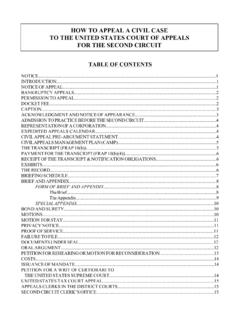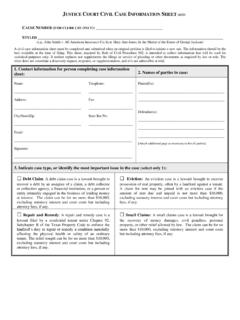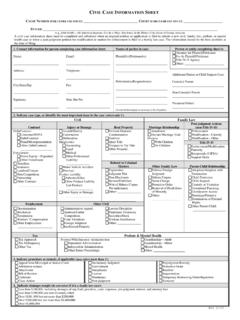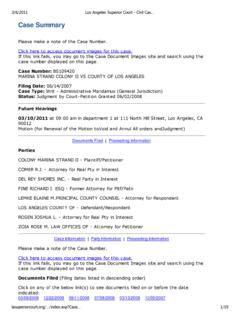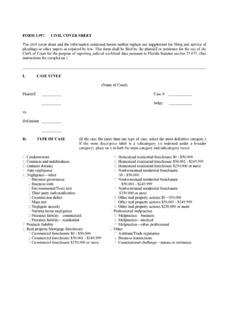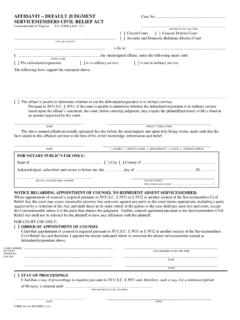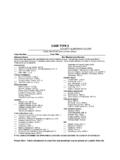Transcription of Role of Civil Society in Democratisation: A Case Study of ...
1 1 Role of Civil Society in democratisation : a case Study of Zambia By Ms. Sreya Maitra democratisation , in contemporary politics has been considered a sine-qua-non of political maturity and modernisation. However, the process of democratisation involves not just the transition to democracy but also its subsequent consolidation. While scholars across the world have deliberated on the requisites of accomplishing democratisation , most concede that the process requires a crucial role to be played by the Civil Society . Zambia has served as a case in point. democratisation process in Zambia has been considered by most as a success story. The electoral defeat of the United National Independence Party (UNIP) under the leadership of Kenneth Kaunda after twenty-seven years of rule and the abolition of the one-party state were primarily instigated by mass-based popular movements.
2 The subsequent multi-party elections on 31st October 1991 ushered the regime of another political party the Movement for Multi-Party Democracy (MMD) and led to peaceful change of government. The present paper argues that in the light of the recent democratic election of President Rupiah Banda, the existence of an alert and strong Civil Society would remain crucial for Zambia. It would be an imperative to keep in mind the lessons learnt from the mass movement of the 1990s, against the regime of Kenneth Kaunda. For the purpose, the paper proposes a case Study of the role of the Civil Society in the processes of democratisation and re- democratisation in Zambia in the 1960s and 1990s respectively. The paper would highlight certain challenges faced by the Civil Society in remaining an 2important democratic player in Zambia and conclude with the prospects for the near future.
3 Scholars have defined the Civil Society as an arena of action and interaction, operating from spaces between the family, the state, and the private sector. It exists in the plural, as it is cross-cutting in its approaches to sectors and issues, and absorbent and reflective of a basically unlimited range of interests, purposes and influences. As an arena of action and interaction, Civil Society is shaped, first, by the nature of the needs and interests it responds to, and, second, by the specific environment that determines its rooms for manoeuvre, for mobilisation, co-operation, articulation and Civil Society in Zambia has been shaped by a history of authoritarian traditions, first during the colonial area, later-on during one-party rule in a welfare state. For several decades, therefore, Civil Society was largely restricted to activity within the agendas and control of the state.
4 However, some membership-based organisations and institutions with well established traditions eventually formed the nucleus of a powerful citizens movement that eventually lead to a peaceful political transition. The Historical Setting: The Republic of Zambia was declared on 24th October 1964, under the leadership of Kaunda s UNIP. Scholars observe that political life in Zambia at this time was paradoxical in nature as on the one hand, political power was centered in the hands of the President, at the same time it was diffused among many offices. In 1973, the old constitution was abrogated in favour of a new one, which emphasised on a strong President, a unicameral legislative assembly, formulation of national policies by the Central Committee of the UNIP, and the President of the UNIP to be the President of Zambia, who in turn would be nominated by the UNIP General Council.
5 Following the Chona recommendation for one-party participatory democracy the Second Republic was established in 1968. Though Kaunda condemned human exploitation and laid the foundation of Zambian Humanism to promote central planning, preservation of traditional African values like trust, loyalty to the communists and mutual aid, strong education system, affirmative action for the poor and so on, he largely remained inclined towards authoritarian tendencies. He relied on repression though opposition was tolerated 3within the party as well as from the non-governmental platforms. Kaunda firmly entrenched the Presidential system and his presidential powers were vast. He never abolished the state of emergency which had been promulgated during the rising of the Lumpa sect in 1964. During the whole of his rule, parliament remained at best a platform to let off steam and at worst an inert Civil Unrest and Mobilisation: By the 1970s however, the Civil Society in Zambia began to mobilize against the Kaunda regime.
6 This involved not only the political parties but also intellectual groups, businessmen, sections of mineworkers and trade unionists. The causes for the grievance maybe highlighted at this juncture: Incapacity of the one-party rule to combat declining economic fortunes of Zambia, Inflation and instability: Zambia depends for its foreign exchange and government income on the copper mines. The massive increase in the price of oil in the 1970s was coupled by a slump in the price of copper which culminated in a serious slump in Zambian export earnings. The underlying strength of the economy was impaired. Food prices began to soar and unemployment was rampant. Though Kaunda had consistently tried to co-opt the opposition on as broad a front as possible, he could not cope with the decline in resources to distribute. Nature of the Protest: The Civil Society was fiercely active in its protest especially in urban areas.
7 The evidences of the government s mismanagement of economy and malpractices further discredited the regime. There was an increasing demand for the introduction of multi-party system. By February 1990, two trade unionists called for a referendum on the one-party state because the apathy in party elections was a sign that enthusiasm for one-party system had been eroded to an unacceptable degree. The MMD mobilised a cross-section of the Civil Society . In other words, the continuing of political protests in Zambia found a legitimate platform under the MMD. There were prominent UNIP politicians, elite sections of the population, trade union leaders and even religious factions. Churches took the initiative of establishing their own monitoring organisations: 4the Zambian Elections Monitoring Coordinating Committee.
8 This was supported by the Law Association of Zambia; the Press Association of Zambia and the Women s Lobby Group. Factors outside Zambian Society also played a significant role. The international institutions legitimised MMD. The resistance to one-party system was also supported by the judiciary s impartial nature. Scholars thus opine that the call for multi-party system should not be seen as a sudden break with the past but rather as a logical expression of opposition which had always been The re-introduction of multi-party system bore testimony to the success of the active intervention of the Civil Society . Though Kaunda tried to forge a national consensus on political reform through a broadly composed commission, the MMD refused such encapsulation by Kaunda in a national forum and opted for a strategy of maximising demands.
9 On 30th November, 1990 the Parliament voted unanimously for a constitutional amendment which made the introduction of multi-party system possible. This was ratified by Kaunda in December. The Mvunga Commission reported on the re-introduction of multi-party system at the end of April 1991 and the new features of governance were articulated. Elections were organised on 31st October 1991 by the Zambian government itself as the state of emergency had not been repealed. The election resulted in an overwhelming victory for Chiluba and MMD which won 125 out of the 150 Parliamentary seats. Growth in the Role of Civil Society : Civil Society organisations have continued to grow in Zambia since the 1990s. In addition to a consolidation of established key players, a plethora of new organisations, umbrellas and formal or informal networks have been entering the scene.
10 By 2003, in a country of some ten million people, about ten thousand Civil Society organisations have been registered, making up even double as many with their branches. They have addressed a wide range of issues concerning development; from eradication of poverty, governance, democracy, human rights and the rule of law. A recent example of Civil Society participation would be in the context of formulating Zambia s Poverty Reduction Strategy Paper (PRSP), where a large network was formed, cross-cutting in its sector-specific, regional and topical dimensions. It involved a process 5of consultation between the Civil Society and government. Eventually, a major national policy paper was formed largely shaped by knowledge and experience gained within Civil Society . The media is an important Civil societal force in Zambia and has played a crucial role in developing a much more open Society .
